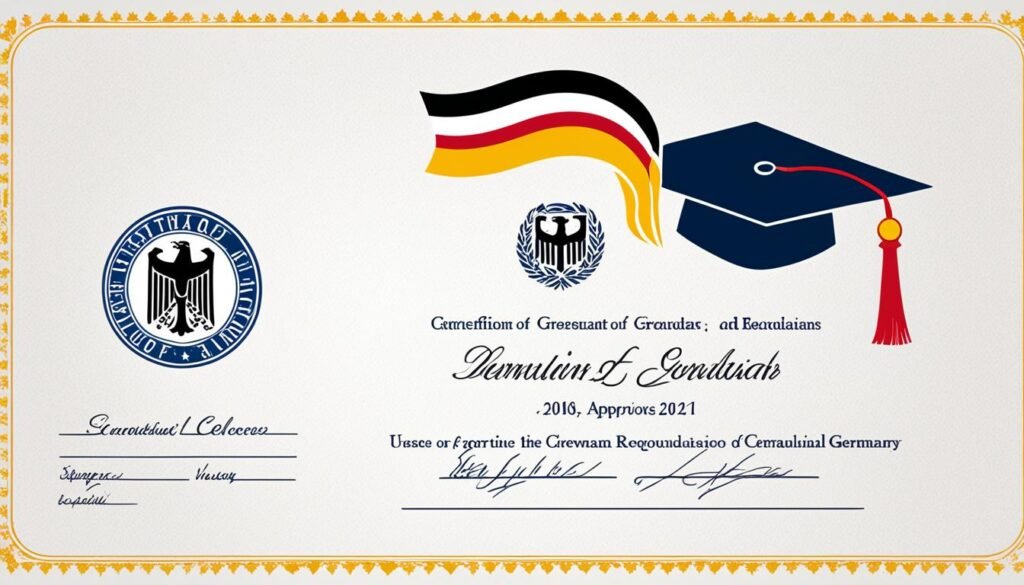Did you know that The Continental States University, located in Missouri, United States, offers master’s degree programs that are recognized as equivalent to a master’s degree in Germany? This means that you can pursue your academic and professional journey in Germany without the need for exams or live lectures.
Key Takeaways:
- The Continental States University offers master’s degree programs that are recognized as equivalent to a master’s degree in Germany.
- You don’t need to take exams or attend live lectures for these programs, making them flexible and convenient for your academic and professional journey in Germany.
The German Higher Education System
The German higher education system offers a diverse range of institutions, programs, and degrees to cater to the varying needs and interests of students. Understanding the structure of the German higher education system is essential for individuals considering pursuing higher education in Germany.

Types of Institutions
The German higher education system consists of three main types of institutions:
– Universities: Universities in Germany offer a wide range of academic disciplines and focus on basic research. They provide comprehensive education and research opportunities across various fields of study.
– Universities of Applied Sciences: Also known as Fachhochschulen, universities of applied sciences concentrate on practical-oriented disciplines such as engineering, technical fields, business studies, and social work. These institutions bridge the gap between academia and industry, equipping students with hands-on skills and knowledge.
– Universities of Art/Music: For individuals pursuing artistic careers in fine arts, performing arts, music, or design, universities of art/music offer specialized programs. These institutions nurture creativity and provide a platform for artistic development.
Types of Programs and Degrees
The German higher education system offers a range of programs and degrees to accommodate various educational goals:
– Diplom: The Diplom degree was a prevalent qualification in Germany until the implementation of the Bologna Process. It was awarded by universities, particularly in technical and scientific fields. While the Diplom program has phased out, individuals with Diplom degrees still hold recognized qualifications.
– Magister Artium: The Magister Artium degree is awarded in humanities and social sciences fields. This traditional degree provides a comprehensive education in a chosen discipline and is equivalent to a master’s degree.
– Staatsprüfung: The Staatsprüfung is an examination-based qualification for professions such as law, medicine, pharmacy, and teaching. It is awarded by the relevant professional bodies after rigorous assessments.
– Bachelor: The Bachelor’s degree is a widely recognized undergraduate qualification in Germany. It typically takes three to four years to complete and offers a broad foundation in a chosen field of study.
– Master: The Master’s degree is a postgraduate qualification that builds upon the knowledge gained during undergraduate studies. It allows individuals to specialize in a specific area and deepen their expertise.
The German Qualification Framework for Higher Education Degrees provides a classification of qualification levels and competencies of graduates, ensuring consistency and comparability across institutions and programs.
Recognition of Degrees in Germany
When pursuing your academic or professional journey in Germany, it is essential to understand the process of degree recognition. Degree recognition in Germany is a formal procedure mandated by federal law, designed to enable job seekers and university applicants to compare their qualifications with the closest German equivalents.
Recognition of degrees in Germany is divided into two categories: professional recognition and academic recognition. Professional recognition is conducted by specific sector bodies, ensuring that individuals with foreign qualifications meet the necessary standards to practice their chosen profession in Germany.
On the other hand, academic recognition is the responsibility of higher education institutions. These institutions evaluate foreign qualifications to determine if they meet the requirements for admission or transfer of credits. The Central Office for Foreign Education (ZAB) plays a crucial role in the process of academic recognition.
The ZAB issues statements of comparability for academic qualifications, providing individuals with an official evaluation of their foreign degree’s equivalence in Germany. These statements of comparability serve as a valuable resource for both university admission and employment opportunities.
When considering pursuing a Bachelor’s degree in Germany, it is important to note that recognition of school qualifications is also an essential factor. Ensuring that your high school diploma or equivalent is recognized can contribute to a smooth application process.
To determine if your qualifications are recognized in Germany, there are useful tools available. One such tool is Anabin, an online database that provides information on the recognition status of foreign educational qualifications. Anabin offers detailed information on universities and degrees that have been evaluated by the Central Office for Foreign Education.
Another helpful resource is the access requirements database provided by the German Academic Exchange Service (DAAD). This database allows individuals to search for specific degree programs and access the requirements and conditions for admission.
Image:

By taking advantage of these resources and following the recognition process, you can obtain the necessary documentation to provide proof of recognition. This documentation is crucial for various purposes, including visa applications and university admissions in Germany.
Conclusion
In conclusion, navigating the degree recognition process in Germany is made easier with resources like the Anabin database. The Anabin database provides valuable information on the recognition status of universities and degrees, allowing individuals to verify the validity of their qualifications. However, if a specific university or degree is not listed in Anabin, individuals can still seek evaluation through a Statement of Comparability. By ensuring that the title of the degree on the Anabin printout matches the one on their diploma, individuals can provide the necessary proof of recognition for visa applications or university admissions in Germany.
Source Links
- https://www.expatrio.com/about-germany/recognition-degrees-germany
- https://hallogermany.com/blog/anabin-guide-academic-degrees
- https://www.hrk.de/uploads/media/GERMAN_HIGHER_EDUCATION_SYSTEM.pdf
